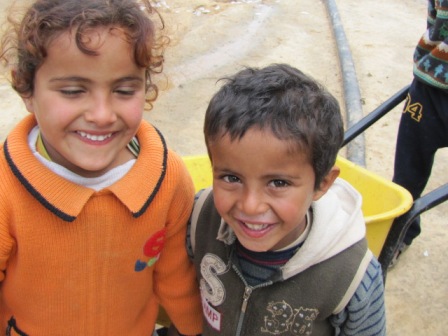24 February 2011 | Vera Macht, ISM Gaza

“I only have you to count on. From now on, my children depend on you.”
This was the desperate call of a man who sees no way out for himself and his children, and we ISM members who came to his phone call, received it in helpless silence. It is not the first time that we have visited this family, and every time we go home more horrified.
The last time we were there was on the 14th July 2010, a day after his wife died; was murdered, there is no other way to say it. Nasser Jabr Abu Said lives in Johr al-Dik, 350 meters away from the border with Israel. On the evening of the 13th July, Nasser’s wife was in the garden with two other women from the family when they were fired at with artillery shells from a nearby tank. They used flechette shells, which explode in the air so that five- to eight-thousand nails shoot out of them, piercing everyone and everything in a cone of 300 by 100 meters. They are also illegal under international law.

Nasser’s wife was not injured, but the Nasser’s sister was wounded in the shoulder, and a third woman, Sanaa Ahmed Abu Said, 26, was wounded in the leg. The family took shelter in the house and called an ambulance, which was unable to approach because it was stopped by machine gun fire from the nearby Israeli soldiers. At this point, the 33 year old wife of Nasser, Nema Abu Said, realized that the youngest of her children, Jaber, was asleep in the garden. As Nema ran outside to bring him to safety, she and her brother-in-law were pierced by the nails of another flechette shell. It took four endless hours before the ambulance finally got the permission to help the family, but by then Nema had died.
When we first visited the family, no one had yet had the heart to explain to Jaber that his mother had died. He kept asking for her while we were there, but how do you explain something like that to a three year old child?
When we went this time, all the children knew only too well what had happened. Nasser explained that he could no longer live in the house because of the almost daily incursions; bombs and shootings have destroyed their damaged psyche and now they wake up every night, screaming from nightmares and having wet the bed. UNRWA rented a tiny apartment for the family – right next to the cemetery where the mother is buried. “I couldn’t get my children away from their mother’s grave. It happened more and more that I suddenly noticed at night that one of the children had gone, and I found them crying in the cemetery, I knew I couldn’t stay there any longer”, Nasser told us.
His alternative is disconcerting. He has pitched a tent, funded by the Red Cross, a few hundred meters away from his old house. The Red Cross also brought three blankets. When Nasser requested more aid he was told that he had already been helped. UNRWA told him that they could not finance a new house. Although they also recognized that the danger was too great to stay in the old house, they said that the old house would first have to be destroyed. Until the house is destroyed, they won’t act.

In this tent, amid the rain of the winter, Nasser now sleeps with his four sons and his daughter, 3, 5, 8, 9 and 10-years-old. They sleep on only two mattresses because he has to burn the old mattresses every few weeks, as every night they are wetted by the children. There is not enough money for new mattresses, for a sufficient amount of blankets, clothes and school uniforms for the children, or for their transportation to school. He doesn’t dare to send them to school before it’s light, which means that they miss two hours of lessons every day. “They urgently need psychological care,” says Nasser quietly; he didn’t know where to start when we asked him what he needed the most. They received psychological care for a short while, and the psychologist diagnosed that they remained mentally in the state which they were in when their mother died. When a few days ago the bombs fell – one of them near the house – the children’s screams woke up their father.
They need the continuous care of their father, but that is not the only thing that prevents him from earning money. Nasser can’t farm his land any more: it was too often flattened; it is situated mainly in the inaccessible buffer zone; and he lacks the resources to be able to start farming the rest of his land. He doesn’t have the money for seeds to plant something. “I would love to plant eggplants again, cabbage and watermelons. Also, sheep would be a big help. But my water system is completely destroyed from the bombs, and I lack the money to rebuild it.”
“I am an old man,” Nasser Abu Said says, 37 years old, “to me it is no longer important, but what about my children? Don’t they have the right to life, the right to grow up in safety and with some joy?”
“From now on, my children depend on you,” this sentence stays in your mind. And so I do what is in my power. I write about it. Nasser’s misery concerns all of us. This wasn’t fate, that wasn’t a natural disaster. A few years ago, Nema and Nasser Abu Said were a happy and content family.

